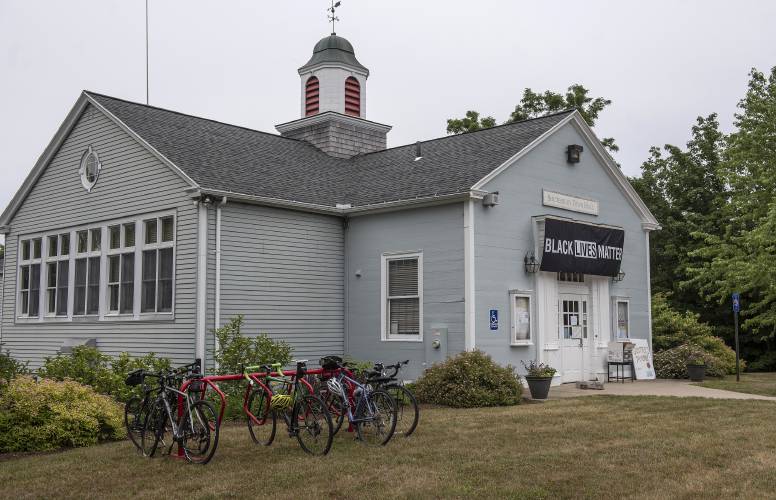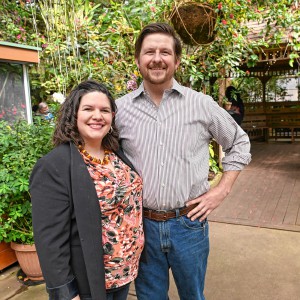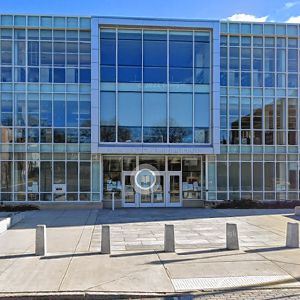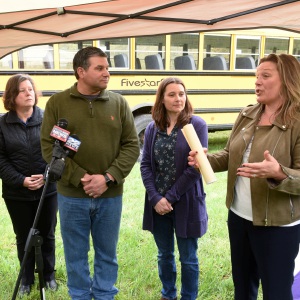Leverett, Shutesbury, Westhampton join digital equity program to expand internet to all residents

Shutesbury Town Hall at 1 Cooleyville Road. GAZETTE FILE PHOTO
| Published: 02-25-2024 2:31 PM |
All Leverett and Shutesbury residents have access to high-speed Internet connections, following the municipal build-out of broadband over the last decade or so, but a small portion of households continue to opt against becoming subscribers.
In Westhampton, a 2022 master plan survey indicated that more than nine in 10 residents appreciate that broadband infrastructure is critical to town services and maintaining the local economy. Yet a portion of residents, particularly those in remote locations and so-called “last mile” neighborhoods, remain without internet connections.
Understanding that challenges remain in getting all homes linked to broadband, the three communities in Franklin and Hampshire counties this week joined 75 other cities and towns as part of the Massachusetts Municipal Digital Equity Planning Program, a Massachusetts Broadband Institute initiative to help communities with resources to bridge the digital divide and expand internet access.
For Shutesbury and Leverett, which will be working in tandem with consultants at the Frankllin Regional Council of Governments, the main focus will be to identify impediments to internet access, find solutions to bridge the existing digital divide, and confront issues around affordability, digital literacy training, device access and any other barriers.
Gayle Huntress, Shutesbury’s municipal light plant manager who chairs the Broadband Committee, said the planning is in the early stages, with a goal to improve digital equity for residents.
“Our municipal broadband network that covers the entire town means that we’ve got the infrastructure problem solved already,” Huntress said. “Now it is about improving access and education to the technology.
In 2015, Shutesbury voters approved a $1.69 million Proposition 2½ debt-exclusion override to fund the project, and have achieved a goal of providing active gigabit service to 90% of all households for only $60 a month. Now, the town is focused on connecting the last 10% of residents, through measures such as addressing affordability, helping the senior citizen population with digital skills, especially when it comes to cybersecurity, getting connected to resources, such as the federal Affordable Connectivity Program, and to create, disseminate, and analyze surveys to reveal equity gaps.
Leverett was the first of 45 rural communities in western and central Massachusetts to complete the last-mile network, a project beginning in 2012, following a Propsition 2½ override debt exclusion to pay for the 39-mile aerial network, supplemented by $666,000 from MBI for the $3.6 million project.
Article continues after...
Yesterday's Most Read Articles
 Northampton Housing Authority boss placed on leave
Northampton Housing Authority boss placed on leave
 NCAA Div. 1 Men’s Ice Hockey: UMass stuns Minnesota 5-4 in OT, advances to regional final
NCAA Div. 1 Men’s Ice Hockey: UMass stuns Minnesota 5-4 in OT, advances to regional final
 UMass Men’s Basketball: Three Minutemen enter transfer portal
UMass Men’s Basketball: Three Minutemen enter transfer portal
 Putting themselves on the line: Activists say nonviolent protests focus attention, inspire others, drive change
Putting themselves on the line: Activists say nonviolent protests focus attention, inspire others, drive change
 Ready to roll on roads: Amherst priority list tees up $4.55M to rebuild some of town’s worst stretches
Ready to roll on roads: Amherst priority list tees up $4.55M to rebuild some of town’s worst stretches
 USDA yanks $3.4M in aid to state food banks
USDA yanks $3.4M in aid to state food banks
LeverettNet is a municipal broadband network available to every resident and 95% of households are subscribed. But the town will investigate with its consultants the other 5% of unsubscribed households to determine their barriers to connection, which could include cost, training and devices. The support from the MBI will lead to a completed report, important since the town doesn’t have the resources to conduct a comprehensive digital equity needs assessment.
For Westhampton, where residents understand the centrality of reliable broadband, such as for emergency response, officials are prioritizing reliable access to high-speed internet by working with service providers and the MBI to learn more about existing network availability and reliability. The town will also focus on distributing devices, expanding literacy and creating financial resources to help those without connections.
Massachusetts Economic Development Secretary Yvonne Hao said in a statement that Massachusetts continues to lead the nation in addressing the digital divide and providing cities and towns resources to enhance accessibility and education.
“This program will enable more municipalities to empower their residents, providing not only internet access, but also with the necessary training, devices, and expertise to compete in the digital economy,” Hao said. “As commerce, job opportunities, and essential resources shift online, ensuring robust connections is crucial for residents to excel now and in the future.”
Scott Merzbach can be reached at smerzbach@gazettenet.com.






 Hopeful buyers emerge for Magic Wings butterfly conservatory in South Deerfield
Hopeful buyers emerge for Magic Wings butterfly conservatory in South Deerfield Area briefs: Mount Holyoke’s Trailblazers of Color conference; Holyoke Library to host annual mini golf and games; Westfield State launches paramedic program
Area briefs: Mount Holyoke’s Trailblazers of Color conference; Holyoke Library to host annual mini golf and games; Westfield State launches paramedic program  Legislation inspired by a Leverett family allows school bus monitoring systems
Legislation inspired by a Leverett family allows school bus monitoring systems
